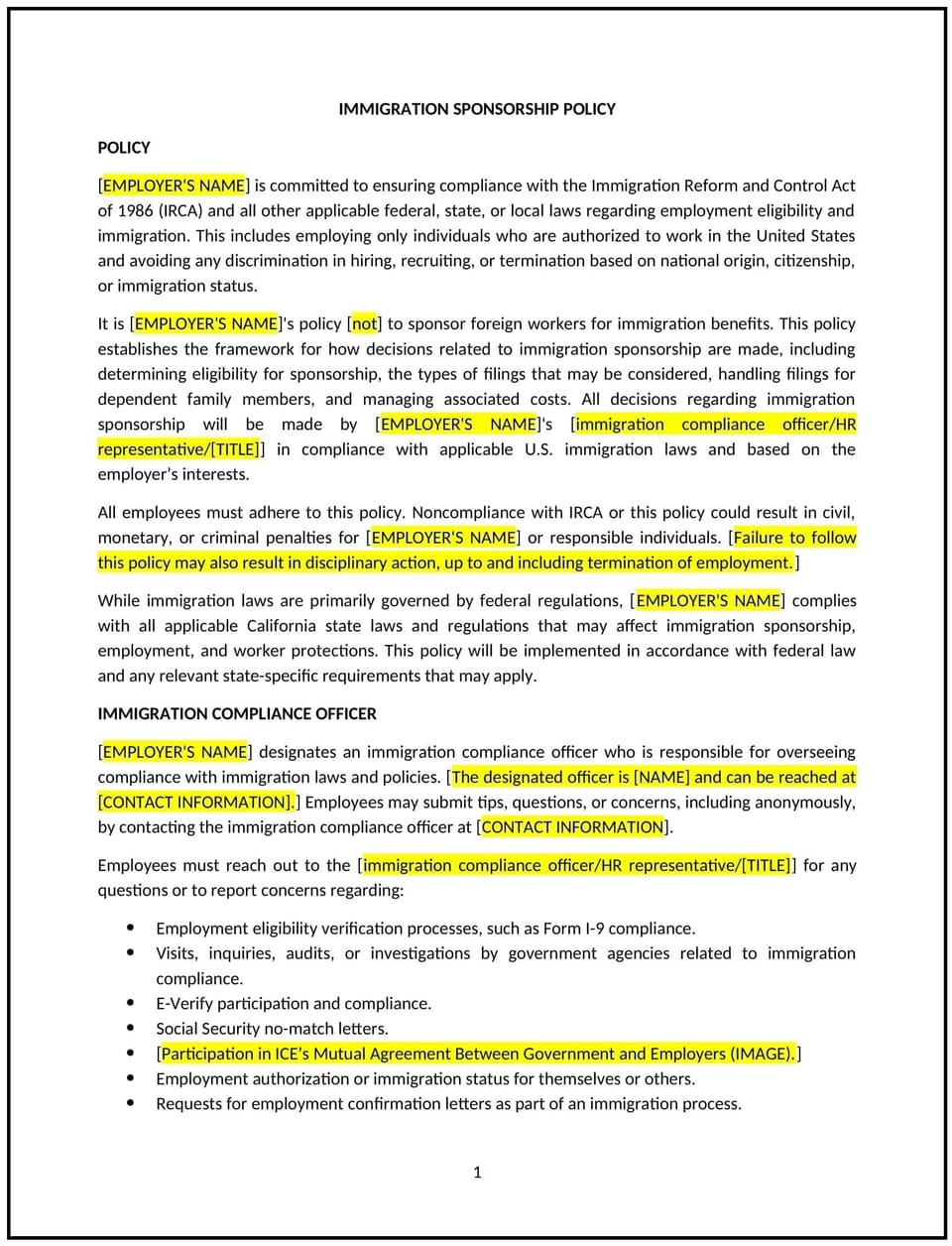Immigration sponsorship policy (California): Free template

Immigration sponsorship policy (California)
In California, an immigration sponsorship policy provides businesses with guidelines for sponsoring work visas or permanent residency for eligible employees. This policy ensures a consistent and transparent approach to immigration sponsorship while supporting compliance with federal and state laws, including California’s anti-discrimination regulations under the Fair Employment and Housing Act (FEHA).
This policy outlines eligibility criteria, sponsorship procedures, and the business’s expectations for employees receiving sponsorship. By implementing this policy, California businesses can attract global talent while maintaining fair and lawful practices.
How to use this immigration sponsorship policy (California)
- Define eligibility: Specify the qualifications and job roles eligible for sponsorship, such as positions requiring specialized skills or knowledge.
- Outline sponsorship procedures: Provide clear steps for initiating and completing the sponsorship process, including documentation and timelines.
- Address employee responsibilities: Detail the expectations for employees receiving sponsorship, such as maintaining work authorization and adhering to job requirements.
- Communicate cost-sharing: Clarify whether the business or the employee is responsible for covering sponsorship-related expenses, following applicable laws.
- Ensure compliance: Reflect federal immigration laws and California’s anti-discrimination requirements in the sponsorship process.
Benefits of using this immigration sponsorship policy (California)
This policy offers several advantages for California businesses:
- Supports compliance: Reflects California and federal laws governing immigration sponsorship and workplace fairness.
- Attracts global talent: Helps the business recruit and retain skilled workers from diverse backgrounds.
- Promotes transparency: Establishes clear guidelines for employees and managers, reducing confusion or disputes.
- Enhances employee loyalty: Demonstrates the business’s commitment to supporting employees’ long-term career development.
- Reduces risks: Minimizes legal and operational risks by ensuring sponsorship processes adhere to regulatory requirements.
Tips for using this immigration sponsorship policy (California)
- Reflect California-specific considerations: Address state anti-discrimination laws to ensure fairness during the sponsorship process.
- Partner with legal experts: Consult immigration attorneys to manage complex visa processes and ensure compliance with federal regulations.
- Train managers: Provide training on managing immigration sponsorships and supporting sponsored employees effectively.
- Document processes: Maintain thorough records of sponsorship applications, approvals, and associated communications.
- Review regularly: Update the policy to reflect changes in immigration laws, California regulations, or business needs.
Q: How does this policy benefit the business?
A: This policy supports compliance with immigration and anti-discrimination laws, enhances recruitment efforts, and helps retain skilled employees.
Q: What types of visas are typically sponsored under this policy?
A: Commonly sponsored visas include H-1B for specialized workers, L-1 for intra-company transfers, and green cards for permanent residency.
Q: How does this policy support compliance with California laws?
A: The policy reflects California’s anti-discrimination regulations and federal immigration laws, ensuring lawful and fair sponsorship practices.
Q: What steps should employees take to request sponsorship?
A: Employees should follow the procedures outlined in the policy, including submitting documentation and discussing their needs with HR or management.
Q: How can the business manage costs associated with sponsorship?
A: The business can establish clear cost-sharing guidelines and work with legal professionals to streamline processes and reduce expenses.
This article contains general legal information and does not contain legal advice. Cobrief is not a law firm or a substitute for an attorney or law firm. The law is complex and changes often. For legal advice, please ask a lawyer.


